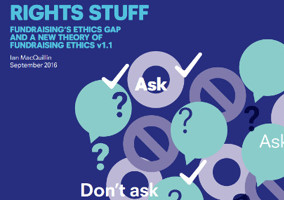Late last month William Shawcross, chair of the Charity Commission, finished his final address to the charity sector with an impassioned plea that charities “live their values” in the way they conduct themselves.
Charities, he said, must behave as upstanding citizens, and conduct themselves with respect for their donors and the public, as well as their beneficiaries.
It doesn’t sound like a tricky challenge, but in some ways it is. Because it’s easy for the sector to become focused on providing a narrow benefit to a narrow group of beneficiaries, and ignore the wider externalities that might emerge from their actions. Surprisingly often, you see a charity which is doing a lot of harm in its pursuit of good. A few are probably worse than useless to society as a whole.
It’s not unknown for a charity to adopt a stance which another charity is willing to solicit donations to campaign against. And that doesn’t feel right at all.
After all, there’s limited use campaigning against other people being bastards to your beneficiaries, if you’re a bastard to other people’s beneficiaries when no one’s looking.
Margins and extremes
At the extremes, it’s an easy call to say that a charity’s strayed too far from the sector’s ethical roots. At the margins it’s much harder.
The Presidents Club saga offers examples of both extremes and margins. Obviously the charity itself was delivering some public benefit, but the way it was doing so was so offensive to the wider public good that there was a clear consensus: it should be shut down.
On the other hand, its beneficiaries faced a harder moral choice. Should they return funds which had already been donated, to show that the fundraising sector did not condone sexual harassment?
Several said they would, and found – to the surprise of some, myself included – that the public as a whole didn’t back the choice. Although I’d still question whether the public would have felt the same way about whether charities should take more donations from the same source, knowing it was morally questionable.
Difference between taking and making money
The public have previously taken a different stance about donations from morally questionable activities. When Comic Relief was showing to be making money out of tobacco, the public decried it. When charities made money from trading people’s data, that too was beyond the pale.
The answer seems to be that it’s okay to take tainted money, but not to collude in making it tainted, and certainly not to behave in morally questionable behaviour yourself in order to make money.
So there’s a certain amount of moral relativism the public will condone. Mind you, to what extent should the public will dictate your behaviour? To what extent should a charity be a weathercock, turning with the views of the multitudes, and to what extent should it be a signpost, taking a moral stance against behaviours which the public accept, but which the charity itself believes unethical?
Too focused on single issues
Too often, charities choose to be signposts on their own single issue, and weathercocks on all others. Too often charities behave in one way when they think people are watching, and in another way when they think no one cares.
(Charities also tend to see themselves as individual entities, whereas the public views them with a much greater degree of homogeneity – a single unit, dedicated towards a common good, working in harmony with each other.)
The responsibility to behave ethically, outwith the needs of their own beneficiaries, is a balancing act. The public expect charities to put beneficiaries first, but be courteous in their fundraising, generous to those on low pay and moderate with those on higher pay, ethical when investing money, concerned about their environmental impact, and fair in their treatment of volunteers, staff and supporters. These aren’t easy standards to live up to, but nor are they unreasonable ones to attempt.
Perhaps it might be worth borrowing the words of the Hippocratic Oath as a good starting point. Do good for your beneficiaries, and do no harm elsewhere.
|
Related articles












